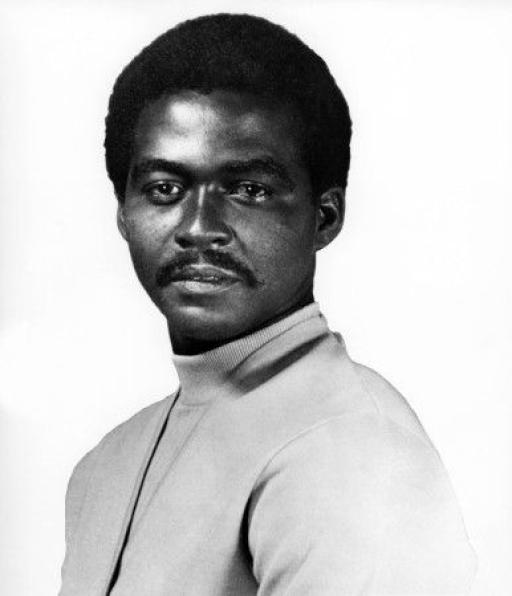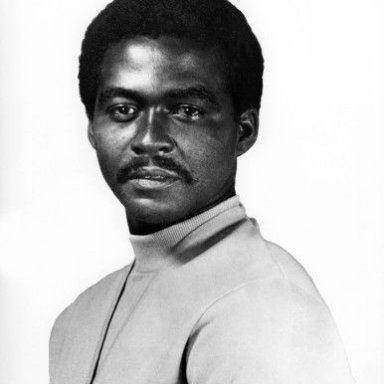
About John Holt Mixed By The Scientist
John Kenneth Holt CD (11 July 1947 [1] – 19 October 2014 [2] ) was a reggae singer and songwriter from Jamaica who first found fame as a member of The Paragons , before establishing himself as a solo artist.
Biography [ edit ]
Holt was born in the Greenwich Farm area of Kingston, Jamaica , in 1947. [3] His mother Amy was a nurse. [4] By the age of 12, he was a regular entrant in talent contests run at Jamaican theatres by Vere Johns , winning 28 contests, some broadcast live on Radio Jamaica . [3] [5] [6] He recorded his first single in 1963 with "Forever I'll Stay"/"I Cried a Tear" for record producer Leslie Kong , and also recorded a duet with Alton Ellis , "Rum Bumper", for producer Vincent "Randy" Chin . [5] [6] [7]
In 1965 Holt joined Bob Andy , Garth "Tyrone" Evans, and Junior Menz in their group the Binders; Menz departed to be replaced by Howard Barrett and they changed their name to the Paragons. [7] They initially recorded for Clement "Coxsone" Dodd 's Studio One before cutting a succession of singles for Duke Reid at his Treasure Isle Studio in the rocksteady era of 1966–1968; They enjoyed a string of hits , including "Ali Baba", "Tonight", "I See Your Face", and the Holt-penned " The Tide Is High " (later made famous by Blondie and also covered by Atomic Kitten ). [8] "Wear You to the Ball" was another of his hits with the Paragons, and it made the charts again when U-Roy (whom he had introduced to Duke Reid) recorded a Deejay version over it. [3] With Andy having left early on, the departures of Barrett (in 1969) and Evans (in 1970), who had both won scholarships in the US, brought the group to an end. [3] [7] During his time with the Paragons, he also recorded solo material for Bunny Lee ("Tonight"), and Harry J . [5] [6] He subsequently concentrated on his solo career, recording for Prince Buster ("Oh Girl", "Rain From the Skies"), Reid ("Stealing Stealing", "Ali Baba"), Dodd (including "Fancy Make-up", " A Love I Can Feel ", "Let's Build Our Dreams" and " OK Fred "), Alvin Ranglin ("Strange Things"), and Phil Pratt ("My Heart Is Gone"). [3]
By the early 1970s, he was one of the biggest stars of reggae, and his work with producer Lee was key to his success; [9] "Stick By Me" was the biggest selling Jamaican record of 1972, one of a number of records recorded with Lee. [3] [5] His 1973 Harry Mudie -produced album, Time Is The Master , was successful, with orchestral arrangements recorded in London by Tony Ashfield . [3] The success of the string-laden reggae led to Trojan Records issuing a series of similarly arranged albums produced by Ashfield starting with the 1,000 Volts of Holt in 1973, a compilation of Holt's reggae cover versions of popular hits (and later followed by similarly named releases up to the Lee-produced 3,000 Volts of Holt ). 1,000 Volts spawned the UK Top 10 hit " Help Me Make It Through the Night " (written by Kris Kristofferson ), which peaked at number 6, [10] and included covers of Billy Joel 's " Just the Way You Are " and " Touch Me in the Morning " by Diana Ross . [11]
He had success back in Jamaica in 1976 with "Up Park Camp" (on a reworking of the Heptones ' "Get in the Groove" rhythm), and his success continued into the 1980s with tracks such as "Police in Helicopter" and "Fat She Fat", recorded with producer Henry "Junjo" Lawes , and a standout appearance at the 1982 Reggae Sunsplash festival. [3] [6] [7] "Police in Helicopter" was a condemnation of the Jamaican government's crackdown on marijuana plantations. [12] The cover to the album single pictured Holt growing locks and a beard, [13] an indication of the increasing importance of Rastafari in his life. [3] He continued to tour regularly, performed several times at Sunsplash in the 1990s, and performed in the United Kingdom with the Royal Philharmonic Concert Orchestra , with a live album taken from these shows released in 2001.
In 2004 he was awarded the Order of Distinction (Commander Class) by the Jamaican government for his contribution to Jamaican music. [4] [14]
Holt's style, notably slower and more romantic than most of his contemporaries, is a recognisable forerunner of the lovers rock subgenre.
His song " Man Next Door " has been covered by numerous other reggae artists, including Dennis Brown , UB40 and Horace Andy . The latter sang in a more electronic vein for the Massive Attack album Mezzanine .
Having been taken ill at the One Love Festival on 16 August, [15] Holt died on 19 October 2014 in the Wellington Hospital in London. [2] [16] [17] He had been diagnosed with colon cancer in June 2014. [18] [19] He is survived by his wife Valerie, 12 children, and 25 grandchildren. [20] His funeral took place on 17 November at Holy Trinity Cathedral in Kingston , and featured performances by U-Roy , The Silvertones , Tinga Stewart , Boris Gardiner , George Nooks , Luciano , Carlene Davis , Ken Boothe , and members of Holt's family, backed by Lloyd Parks and the We the People Band. He was buried at Dovecot Memorial Park. [21] [22]
Album discography [ edit ]
- A Love I Can Feel (1971), Bamboo
- Like a Bolt (1971), Treasure Isle
- OK Fred (1972), Melodisc
- Holt (1973), Jaguar
- Still in Chains (1973), Trojan
- Pledging My Love (1972), Jackpot/Trojan
- Time Is the Master (1973), Moodisc
- Presenting the Fabulous John Holt (1974), Magnet
- The Further You Look (1974), Trojan
- Dusty Roads (1974), Trojan
- Sings for I (1974), Trojan
- A Love I Can Feel (1974), Attack
- Don't Break Your Promise (1974), Lord Koos
- Before the Next Tear Drop (1976), Klik
- Up Park Camp (1976), Channel One
- World of Love (1977), Justice
- Channel One Presents the Magnificent John Holt (1977), Channel One
- Roots of Holt (1977), Trojan
- Showcase (New Disco Style) (1977), Thunderbolt
- Holt Goes Disco (1977), Trojan
- In Demand (1978), Dynamic Sounds
- Let It Go On (1978), Trojan
- Super Star (1978), Weed Beat
- The Impressable John Holt (Disco Mix) (1978), Harry J
- Peace in the Sun (1978), Volt
- Just a Country Boy (1978), Trojan
- Introspective (1980), Dynamic Sounds
- My Desire (1980), Jackpot
- Children of the World (1981), VP
- A1 Disco Showcase (1981), Taurus
- Just the Two of Us (1982), CSA
- Sweetie Come Brush Me (1982), Volcano
- Gold (1983), Creole
- Police in Helicopter (1983), Greensleeves /Arrival
- For Lovers and Dancers (1984), Trojan
- Live in London (1984), Very Good
- Pure Gold (1985), Vista Sounds
- Wild Fire (1985), Natty Congo/Tad's (with Dennis Brown )
- Vibes (1985), Leggo Sounds
- The Reggae Christmas Hits Album (1986), Trojan
- From One Extreme to Another (1986), Beta
- Time Is the Master (1988), Creole
- Sweetie Come Brush Me – Greatest Hits (1988), ROHIT
- Rock with Me Baby (1988), Trojan
- If I Were a Carpenter (1989)
- Why I Care (1989), Greensleeves
- Reggae, Hip House, R&B Flavor (1993)
- Reggae Peacemaker (1993), House of Reggae
- All Night Long (1997), MIL
- New Horizon (1998), VP
- John Holt in Symphony with The Royal Philharmonic Concert Orchestra (2001), Jet Star
- Born Free (2001)
- Fist Full of Holt (2009)
There have also been dozens of compilations of Holt's work, starting in the early 1970s with a Greatest Hits compilation from Studio One, and notably followed by the 1,000 Volts... series on Trojan Records. [5]
DVDs [ edit ]
- John Holt in Symphony With the Royal Philharmonic Concert Orchestra (2003)
- John Holt & Freddie McGregor – Living Legends Live in Concert (2011)
References [ edit ]
- ^ Some sources state 1945 as year of birth
- ^ Jump up to: a b Mason, Peter (20 October 2014). "John Holt obituary" . The Guardian . Retrieved 24 October 2014 .
- ^ Jump up to: a b c d e f g h i Thompson, Dave (2002), Reggae & Caribbean Music , Backbeat Books, ISBN 0-87930-655-6 , pp. 117–120.
- ^ Jump up to: a b Ustanny, Avia (2004), " You Inspired Me Archived 25 October 2014 at the Wayback Machine ", Jamaica Gleaner , 7 November 2004. Retrieved 25 October 2014.
- ^ Jump up to: a b c d e Larkin, Colin (1998), The Virgin Encyclopedia of Reggae , Virgin Books, ISBN 0-7535-0242-9 .
- ^ Jump up to: a b c d Black, Roy (2014) " Holt: One Of The Most Enduring Jamaican Singers ", Jamaica Gleaner , 23 October 2014. Retrieved 23 October 2014.
- ^ Jump up to: a b c d Grossinger, Richard (2005), On the Integration of Nature: Post 9-11 Biopolitical Notes , North Atlantic Books, ISBN 978-1556436031 , pp. 166–176.
- ^ "Veteran reggae singer John Holt dies aged 69 " " . Guardian music . 20 October 2014.
- ^ Iton, Richard (2008) In Search of the Black Fantastic: Politics and Popular Culture in the Post-Civil Rights Era , OUP USA, ISBN 978-0195178463 , p. 399
- ^ Roberts, David (2006). British Hit Singles & Albums (19th ed.). London: Guinness World Records Limited. p. 258. ISBN 1-904994-10-5 .
- ^ "everyHit.com UK Top 40 Hit Database" . Archived from the original on 13 September 2008.
- ^ "Marijuana is not a Jamaican staple crop, Seaga says" . The Washington Post .
- ^ " " John Holt 1983 Police in Helicopter Single Cover" . Google.
- ^ Moskowitz, David V. (2005), Caribbean Popular Music: an Encyclopedia of Reggae, Mento, Ska, Rock Steady, and Dancehall , Greenwood Press, ISBN 978-0313331589 , p. 141.
- ^ "John Holt Receiving Treatment After Collapsing On Stage" , The Voice , 27 August 2014.
- ^ Bonitto, Brian (2014), " Veteran singer John Holt is dead" , Jamaica Observer , 19 October 2014. Retrieved 20 October 2014.
- ^ Johnson, Richard (2014), "Holt Remembered" , Jamaica Observer , 21 October 2014. Retrieved 22 October 2014.
- ^ Hudson, Rykesha (2014), "John Holt's Family Confirm The Singer Died From Cancer" , The Voice , 21 October 2014. Retrieved 24 October 2014.
- ^ Campbell-Livingston, Cecelia (2014), " Jamaica Burial for Holt ", Jamaica Observer , 22 October 2014. Retrieved 24 October 2014.
- ^ Cohen, Howard (2014) " Reggae singer-songwriter John Holt, who wrote ‘The Tide Is High,’ dies at 67" , The Miami Herald , 22 October 2014. Retrieved 25 October 2014.
- ^ Johnson, Richard (2014), " Musical Farewell for Holt ", Jamaica Observer , 18 November 2014. Retrieved 18 November 2014
- ^ Grizzle, Shereita (2014), " Ex-Holt-Ation! Musical Send-Off For John Holt" , Jamaica Gleaner , 18 November 2014. Retrieved 18 November 2014.











